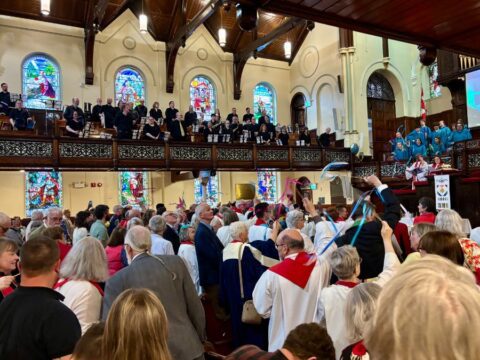We all want to see more youth involvement in our churches. But maybe we’re going about it the wrong way.
“Everyone thinks the problem is ‘youth engagement,’ but youth are already engaged — living their lives,” says Rev. Doug Moore of Laidlaw United in Hamilton. “Let’s face it: the general run of culture is self-focused.”
As far as Moore is concerned, fretting over special arrangements geared to youth is a misguided approach. “How would you like it if you were confined to the ladies’ auxiliary?” he asks me. “Yet we treat youth that way — isolating them into youth groups rather than letting them sit at the table and be part of the discussion and problem solving with the adults.”
Moore seems to have it worked out, with a tight-knit group of 30-odd youth involved in everything from delivering sermons to running movie nights. “Ask yourself first what it is you are doing that is disenchanting to young people,” he suggests. “Stop doing that, and they will come in droves.”
The legitimate desire to include youth in our church communities needs boosting along. Here’s how to make it happen.
Meet their needs
“Are you serving yourself, or are you interested in serving youth?” asks Cindy Casey, co-ordinator of program development at Beaconsfield United in Montreal. “What is important is that we meet youth where they are.”
In the church basement, Beaconsfield runs a centre for LGBTQ youth where they purposely “don’t talk church,” says Casey. Growing up in a suburban community, these youth have few places to go where they can freely and safely express their sexual orientations or gender identities.
“The centre became a natural living-out of our faith,” Casey explains. “Youth nurture one another, they learn everything they can be, and they dream up things they want to do, like the ‘Queers in the Wild’ summer camping trip.”
Are youth really part of the church community if not seated in pews? Casey argues that although these young people may never become members, the church is making a difference in their lives: “We have to get out of the business of maintaining a church facility and back in the business of taking care of people.”
Feed their spirits
Rev. Michael Shewburg is the regional youth pastor at Islington United in Etobicoke, Ont. After returning from cross-country trips with his youth group, he noticed there was no place to “unpack” the energy generated from all they had learned.
So he founded the GO Project, a nation-wide United Church program focused on youth outreach and service. Its purpose is to engage young people, to create opportunities for them to listen to what God might be asking them to do, and to provide occasion and direction in which to act.
“Jesus was in relationship with people,” Shewburg says. “He sat around campfires and talked. So what we are after is conversation about things that matter, not about doing the cool things. That comes after.”
Rick Gunn is another minister who believes in keeping what he calls the “God piece” at the fore. He aims to give kids a space to form spiritual relationships and friendships in a church context. Minister of music and youth at Bedford (N.S.) United, Gunn remarks that many churches assume youth will not be attracted to spiritual disciplines like prayer, meditation and contemplation. “But [young people] don’t shy away from it. They seek it,” he says.
Let them lead
“If we are asking youth to come and join us, we have to make sure they are not coming to work for us,” says Susan Sheppard, minister of youth and Christian education at St. James United in St. John’s, N.L.
“I think a lot of it has to do with giving them permission to explore and do things and not have them do what we think is right,” she continues. “Young people need a place to learn how to be leaders. You’ve got to learn by making your mistakes.”
Sheppard provides information and resources, but the 25 youth in her group are in charge of planning their meetings themselves. A firm believer in youth autonomy, she does caution, however, that it is crucial to have an adult who’s willing to assist. “If you cheer them on but don’t give them the support and knowledge, you are setting them up for failure — lambs to the slaughter.”
The New Generation (NGen) Youth Centre, housed in Centenary United in downtown Hamilton, is a centre that is run by youth, for the 50-plus youth who attend daily. With the goal of building community and empowering youth, young people make the decisions about which programs to offer, how money is managed and so on.
Jordanna Laman, a 20-year-old youth worker at the centre, says adults sometimes unwittingly create barriers that prevent youth engagement. She describes how even in the development of the centre a few years ago, there were adults (from a few partnering groups) making decisions without youth input:
“We were talking about barriers to youth leadership, but they were holding the meetings during the day when we were not available because of school.”
Feeling they hadn’t been invited to the table, the youth said, “We are creating our own table,” Laman recalls.
Some adults chose to leave, but the youth persevered with their vision. With funding from organizations such as the Laidlaw Foundation and the full backing of Centenary United, they were able to open their doors. “Basically, without the support of this church, there would not be a centre,” Laman reflects. “They believed in us.”
Invest in them
What are today’s youth going to inherit from adults? How can the older generation leave this world a little better than they found it?
Martha Martin, a diaconal minister who works as a chaplain at Dalhousie University in Halifax, encourages the idea of investing in youth by hiring a dedicated staff person.
“Research shows that churches that put dollars in staffing and support do well. It’s very hard for a volunteer to do this work,” she says.
Sometimes, despite our best efforts, youth numbers remain small. Martin argues that what you are nurturing in the few youth you have is ultimately more important.
“The challenge is what works in the context of your congregation. People remember encounters, relationships, and it doesn’t have to be big; it can be a small act. We never know the seeds that we are sowing.”
***
This story first appeared in The United Church Observer’s September 2013 issue with the title “Nurturing our youth.”















